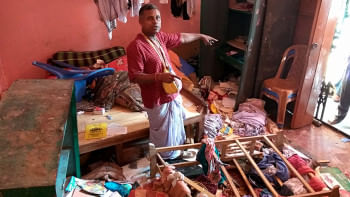We must protect minorities from opportunist criminals

We are deeply concerned by some recent attacks targeting members of the Hindu community, including their homes, temples, and shops. According to a report, the body of a Hindu devotee, Tarun Kumar Dash, was found tied up at the Kashimpur crematorium and temple in Natore on Saturday morning. Police and locals suspect he was murdered by criminals who looted cash, valuables, and religious items from the temple. A murder case has been filed in this connection, but no arrests have been made yet. Earlier, according to another report, miscreants vandalised eight idols across three temples in Mymensingh and Dinajpur. These incidents share similarities with another that took place earlier in the month, whose repercussions are still being felt.
That day, on December 3, an angry mob attacked Hindu residents in Manglargaon village, Sunamganj, following allegations of blasphemy against a young Hindu man who apparently posted an insulting comment about the Quran on Facebook. Despite his arrest under the Cyber Security Act, the mob attacked about 40 houses, several shops, and temples, as per our correspondent who visited the area recently. While security has since been beefed up, for many Hindus, Manglargaon serves as a microcosm of the community's insecurities these days. Horrific accounts given by the victims justify the fear that still haunts them.
According to government estimates, at least 97 cases have been filed and 75 people arrested for alleged attacks on religious minorities between August 4 and December 10. These efforts must be intensified. The authorities must act swiftly and impartially against anyone inciting or committing such crimes. Any lingering fears of minorities, which cannot be erased with temporary security measures or token compensation, also have to be addressed.
We have to acknowledge that these incidents, outrageous as they are, complicate Bangladesh's efforts to counter India's disinformation campaign that persists despite the positivity expressed during the recent high-level talks between the countries. On Friday, just 10 days after Indian Foreign Secretary Vikram Misri's visit, an Indian state minister claimed in the Lok Sabha that 2,200 incidents of violence against minorities occurred in Bangladesh in 2024—a figure rightly dismissed as "misleading" and "highly exaggerated" by Bangladesh. In reality, Ain O Salish Kendra recorded 138 incidents of violence between January and November 2024—which is still concerning but far from India's inflated claims. It bears repeating that most of these attacks were political, not communal, and occurred between August 5 and August 8, when there was no government in place. That said, the continuation of such violence, likely by opportunist criminals taking advantage of the still-fluid security situation, makes it urgent that we address both disinformation and genuine grievances with equal vigour.
While India must stop its disinformation campaign, which only fuels anti-India sentiment and consequently exacerbates insecurities among Hindus, Bangladesh too must ensure that its commitment to peace and harmony, again reiterated by Chief Adviser Muhammad Yunus recently, is matched by resolute action. According to government estimates, at least 97 cases have been filed and 75 people arrested for alleged attacks on religious minorities between August 4 and December 10. These efforts must be intensified. The authorities must act swiftly and impartially against anyone inciting or committing such crimes. Any lingering fears of minorities, which cannot be erased with temporary security measures or token compensation, also have to be addressed. We must adopt a comprehensive strategy combining law enforcement with proper community engagement to ensure their rights, safety, and dignity.


 For all latest news, follow The Daily Star's Google News channel.
For all latest news, follow The Daily Star's Google News channel. 









Comments